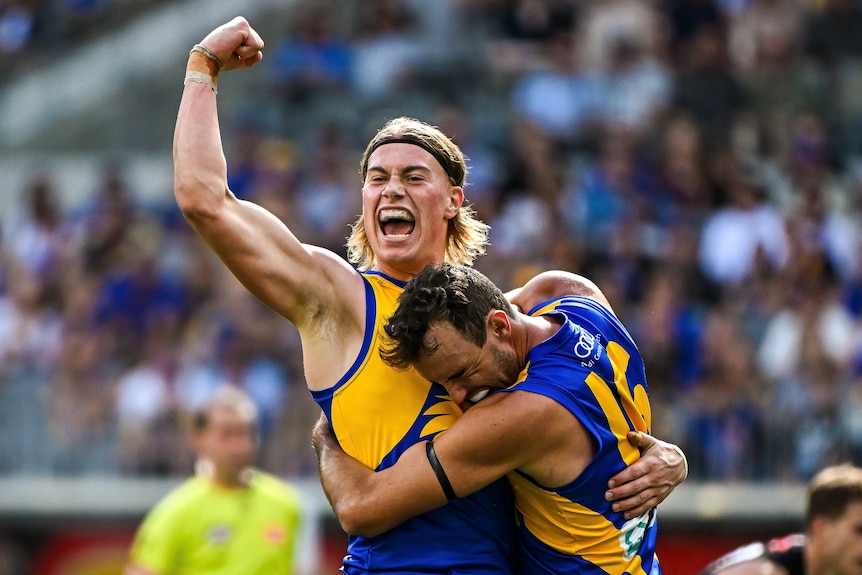AFL legend Paul Roos has questioned whether West Coast’s decision to allow Harley Reid to visit his family while he rests is an example of player power going too far.
Reid was rested for West Coast’s Round 7 clash against Gold Coast and Eagles coach Adam Simpson explained the club’s internal measurements had indicated his body was “flailing”.
The 19-year-old had the opportunity to travel back to Victoria to spend some time with his family during his week off.
Roos, who played 356 games for Fitzroy and Sydney, said it was “ridiculous” Reid had been allowed to fly across the country, given the physical toll long flights take on Perth-based players.
“I understand giving him the weekend off, but what I’m saying is the reason it gets tiring for the West Coast and Freo is the flights,” he told ABC’s AFL Daily podcast.
“If he’s not fit to play, why is he okay to fly back and see his family? We can only assume that was part of the recruiting deal. He’s a No. 1 draft pick, so you’re going to hunker down.” . .
“I don’t understand it because he’s an AFL player who gets paid to play AFL football and his team is playing.
Roos said if Reid was injured and unavailable then he should be in rehab and at home in Western Australia.
“But I understand that if you want to keep the No. 1 draft pick (in the club) and you’re strategizing so he can come back and see his family,” he said.
“We shouldn’t talk about it because he should be playing, and 20 or 30 years ago he would be playing. But now, we have this ridiculous complexity around free agency.
“Let’s not forget what happened with Jason Horne-Francis. He played for North Melbourne Football Club for a year and was traded, so now the players have all the power.”
Reid will return for Saturday night’s clash against Essendon after his bye week, but Roos said West Coast risked lowering their standards by attending to just one player.
“It’s not a great look for the West Coast Eagles, let’s be completely frank,” he said.
“If they lose it and sacrifice the standards of the football club, then it is a lose-lose situation. The standards of the football club must always take precedence over those of a player at all times.
“That’s not to say it wasn’t part of the discussion with the leadership group, and the leadership group might have said that was fine, but if you start lowering your standards, you don’t represent anything.”
Roos, who coached Sydney between 2002 and 2010, suggested clubs should heavily weigh the “coming home” factor when selecting players from interstate. He revealed how the Swans had chosen future club captain Jarrad McVeigh in the 2002 draft over other prospects simply because he was from New South Wales.
“We picked five and we picked Jarrad McVeigh because he was a New South Wales kid, 100 per cent,” he recalled.
“We were weighing up two or three players with that pick, one I remember was a Victorian kid, and we picked Jarrad McVeigh because we knew he was going to stay in New South Wales.
“You have to weigh it up. I would be surprised if West Coast hadn’t considered trading the number one pick last year knowing it was Harley Reid. “It’s a huge risk.
“If North Melbourne had traded the No. 1 pick instead of taking Jason Horne-Francis, they would have gotten a lot more in return. It’s hard to do now, but they would have had those conversations.”
Sports content to make you think… or allow you not to. A newsletter delivered every Saturday.


